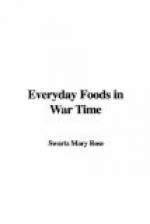Vegetables which are not perfect enough to serve uncooked, like the broken leaves of lettuce and the green and tough parts of celery, are excellent cooked and served with a cream sauce. Cream sauce makes it possible also to cook enough of a vegetable for two days at once, sending it to the table simply dressed in its own juices or a little butter the first time and making a scalloped dish with cream sauce and crumbs the next day. Vegetables which do not lend themselves to this treatment can be made into cream soups, which are excellent as the hot dish for supper, because they can be prepared in the morning and merely reheated at serving time.
Finally, the addition of milk in liberal quantities to tea and coffee (used of course only by adults); its use without dilution with water in cocoa; and instead of water in bread when that is made at home, ought to enable a housewife to dispose satisfactorily of her day’s quota of milk. If it should accumulate, it can be dispatched with considerable rapidity in the form of ice cream or milk sherbet. When there is much skim milk, the latter is a most excellent way of making it popular, various fruits in their seasons being used for flavor, as strawberries, raspberries, and peaches, with lemons to fall back on when no native fruit is at hand.
The world needs milk today as badly as wheat. All that we can possibly spare is needed in Europe for starving little ones. In any shortage the slogan must be “children first.” But in any limited diet milk is such a safeguard that we should bend our energies to saving it from waste and producing more, rather than learning to do without it. Skim milk from creameries is too valuable to be thrown away. Everyone should be on the alert to condemn any use of milk except as food and to encourage condensation and drying of skim milk to be used as a substitute for fresh milk.
When the milk pitcher is allowed to work its magic for the human race, we shall have citizens of better physique than the records of our recruiting stations show today. Even when the family table is deprived of its familiar wheat bread and meat, we may be strong if we invoke the aid of this friendly magician.
CHAPTER II
CEREALS WE OUGHT TO EAT
(Reprinted from The Farmer’s
Wife, by permission of the Webb
Publishing Company.)
“Save wheat!” This great slogan of our national food campaign has been echoed and reechoed for six months, but do we yet realize that it means us? We have had, hitherto, a great deal of wheat in our diet. Fully one-third of our calories have come from wheat flour. To ask us to do without wheat is to shake the very foundation of our daily living. How shall we be able to do without it? What shall we substitute for it? These are questions which every housewife must ask and answer before she can take her place in the Amazon Army of Food Conservers.




